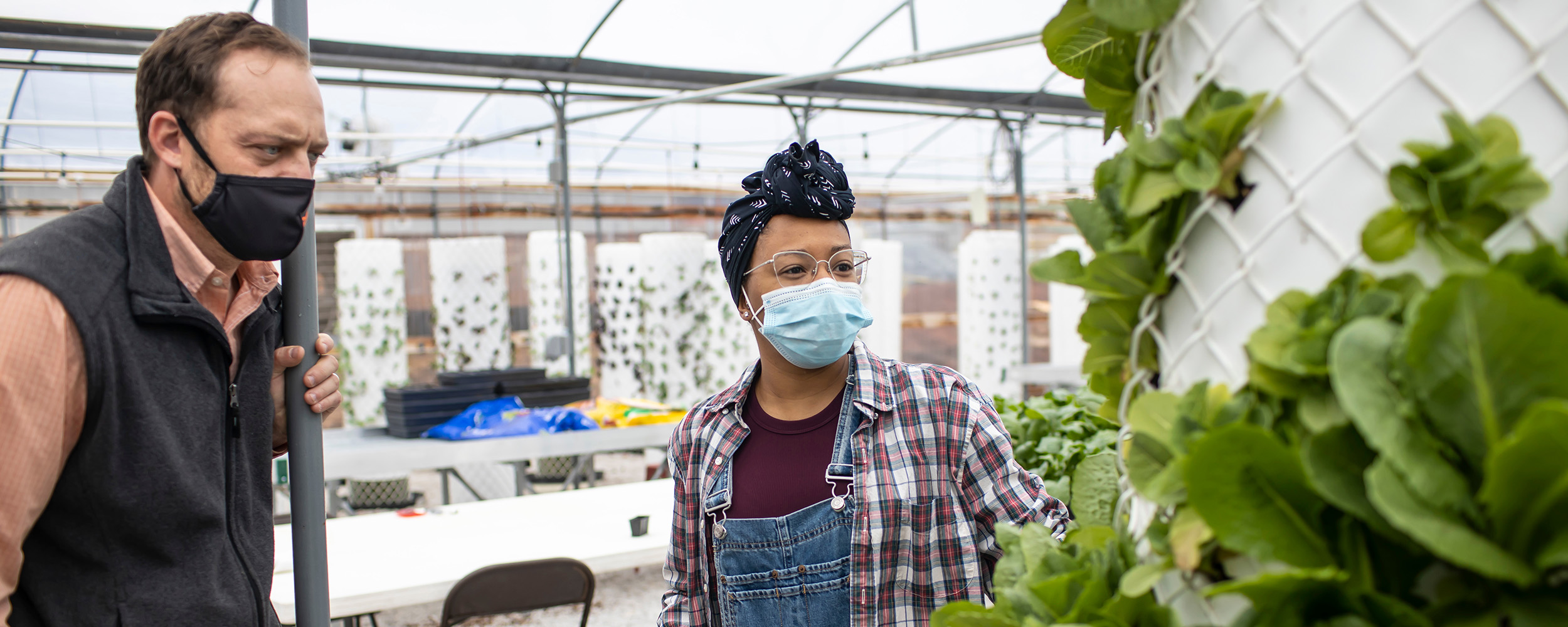
OSU Extension helps launch community grocery store
Wednesday, May 5, 2021
Media Contact: Brian Brus | Agricultural Communications Services | 405-744-6792 | BBrus@okstate.edu
A new community grocery store is bringing healthy produce to a food desert in northeast Oklahoma City, in a private-public partnership supported by Oklahoma State University Extension agricultural expertise.
The Market at Eastpoint, 1708 NE 23rd Street, opened recently with the target of improving food security. In the process, it’s also developing new jobs, transportation infrastructure, urban agriculture education and long-term goals for the community, said Caylee Dodson, executive director at RestoreOKC.
RestoreOKC, the nonprofit arm of Restore Farms, has been working on the project for several years, guided by an advisory board that includes urban agriculture educator Josh Campbell and horticulture specialist Julia Laughlin, both of the OSU Extension Oklahoma County office.
A store stocked with fresh collards and tomatoes is important enough to the community to draw a slate of speakers for its recent grand opening, including Oklahoma City Councilwoman Nikki Nice of Ward 7 and Marc Jones, president of the Homeland grocery store company. The municipality’s Embark transit service also announced it would offer local shuttle service to the store.
The 6,800-square-foot, full-service grocery store provides a much-needed respite in what’s been identified as a food desert – an area that has limited access to affordable and healthy food, according to the U.S. Department of Agriculture. Possible solutions have been discussed for years on City Council.
The absence of such basic food items as okra, green beans and lettuce places the community at a health disadvantage, which ultimately can lead to higher medical expenses and lost employment, to say nothing of the physical and mental development of children in the area, Campbell said.
“When we look at negative trends in health and economic statistics, northeast Oklahoma City has struggled with this problem for many years,” Campbell said. “RestoreOKC and a handful of other initiatives have made big gains, but urban agriculture in the Oklahoma City metro has always been the missing piece.”
With Campbell and Laughlin’s assistance, The Market at Eastpoint offers a variety of fresh, organic fruits and vegetables, grown on Restore’s five-acre urban farm. The farm is worked by about 20 high school students from northeast Oklahoma City.
As urban agriculture gains momentum and public attention, Campbell said he predicts other local, small garden producers will see additional commercial opportunities of their own.
“We will experience a deeper economic impact and ripple effect — money put back into the community,” he said.
“We’re hopeful that this is the first step toward the food desert becoming a food forest,” said Ann Miller, director of Restore Farm. “It’s been so uplifting to see all the work being done at the farm by our student interns and the passion they bring, their belief in themselves to turn this around. When we invest in them, we get so much more back in return. They truly are planting the seeds for the next generation.”
Homeland helped create the business model in the public-private partnership to get the store off the ground. RestoreOKC pays Homeland to provide management and infrastructure for operations, but the store will not carry the company’s brand. Dodson praised Jones for his leadership and assistance.
The nonprofit Inasmuch Foundation provided a grant that will allow the store to be operated for at least three years. Dodson also said RestoreOKC is interested in expanding its relationship with OSU Extension.
“I believe this has created a model that can be replicated in other communities throughout Oklahoma City,” Dodson said.
